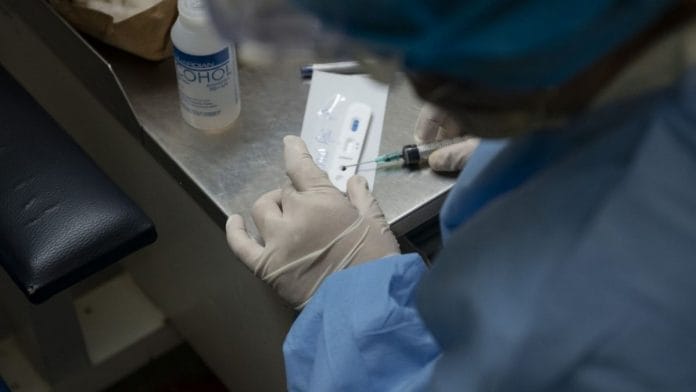New Delhi: The Covid-19 pandemic continues across the world. Currently, the total number of cases stands at 17,92,58,244 and 38,82,091 deaths. It has made its way through over 200 countries and territories.
In some good news, Cuba’s Soberana 2 vaccine candidate has a 62 per cent efficacy with two of its three doses. The country is not importing any vaccines. Switzerland will soon start inoculating children between the ages of 12 and 15 years. Italy and Hong Kong move closer to a post-Covid world as they introduce health certificates and vaccine bubbles for restaurants, respectively.
Switzerland to start vaccinating youngsters by early July
On 4 June, Switzerland approved vaccinating children between the age of 12 and 15 years with the Covid-19 shot from Pfizer and BioNTEch. This plan will come into action by early July.
Underlining how it won’t be compulsory to target a vaccination rate for this age group, government vaccine chief Christoph Berger said, “For those with pre-existing conditions or those in contact with immunocompromised individuals who are at risk, vaccination makes sense.”
“Moderna (MRNA.O), whose shot has been approved for adults in the country, has also submitted a request for its vaccine to be approved for 12- to 17-year-olds, currently under review with drugs regulator Swissmedic,” a Reuters report notes.
Switzerland has recorded 7,01,627 cases and 10,869 deaths.
Also read: India’s ZyCoV-D set to become world’s first DNA Covid vaccine as govt approval likely soon
Hong Kong restaurants try vaccine bubble to attract customers
As vaccination rates rise in Hong Kong, an increasing number of restaurants have begun trying the vaccine bubble or Type D option to attract customers. Hong Kong has put in place four tier arrangements — type A allows no more than two people till 6 pm, type B allows serving up to four people, whose details are noted down, till 10 pm, type C allows six people per table with dine-in services till midnight.
For type D, the top tier, “staff must be fully vaccinated while patrons need to have received at least one jab. Restaurants must use a government scanning app to verify diners’ vaccine status,” South China Morning Post notes.
The report also notes that about 25.9 per cent of the city’s 7.5 million residents have received at least one vaccine shot, while 17.1 per cent had taken both. At least 16 restaurants have graduated to the type D arrangement.
Hong Kong has reported 11,887 cases and 210 deaths till now.
Israeli volunteer helps train dogs to sniff out Covid-19
Three Labrador retrievers named Sadie, Tess and Yuki, and a Golden retriever named Samson are currently being trained by a team in Hawaii to detect those infected with Covid-19.
“The results of the study conducted by Assistance Dogs of Hawaii (ADH), which are expected to be submitted for peer-review as early as this week, show that the dogs are almost 100% accurate at the task,” The Jerusalem Post reports.
When Covid hit last year, Sarit Brinn — who studied dog therapy and training in Israel — decided she wanted to expand her knowledge and try something new.
Similar studies are being conducted across the world in countries like France, Germany, Iran, Columbia, Brazil, the United Arab Emirates.
Israel has reported 8,39,867 coronavirus cases and 6,428 deaths.
Also read: India will experience third wave in 6-8 weeks if Covid norms are not followed: AIIMS chief
Cuba’s Soberana 2 vaccine candidate shows 62% efficacy with 2 of its 3 doses
Citing preliminary data from late phase trials, state-run biopharmaceutical corporation BioCubaFarma has revealed that Cuba’s Soberana 2 vaccine candidate has a 62 per cent efficacy with two of its three doses.
“Cuba, whose biotech sector has exported vaccines for decades, has five vaccine candidates in clinical trials, of which two — Soberana 2 and Abdala — are in late phase trials,” Al Jazeera reports. Results of the vaccine’s efficacy with three doses is expected to be out soon.
The good news comes at a time when the country is reeling from its worst ever Covid-19 outbreak as more contagious variants wreak havoc.
The country has reported 1,67,804 cases and 1,159 deaths.
Unlike many others, Cuba has decided to not import any vaccine, and rely on itself.
“Experts say it is a risky bet but if it pays off, Cuba could burnish its scientific reputation, generate much-needed hard currency through exports and strengthen the vaccination drive worldwide,” the report adds.
What else we are reading:
CureVac’s Covid-19 Vaccine Disappoints in Clinical Trial: The New York Times
The Japanese scientist fighting prejudice, misinformation and COVID-19: The Japan Times
Also read: Too early to tell if Covid booster shot is required, WHO’s chief scientist Swaminathan says






